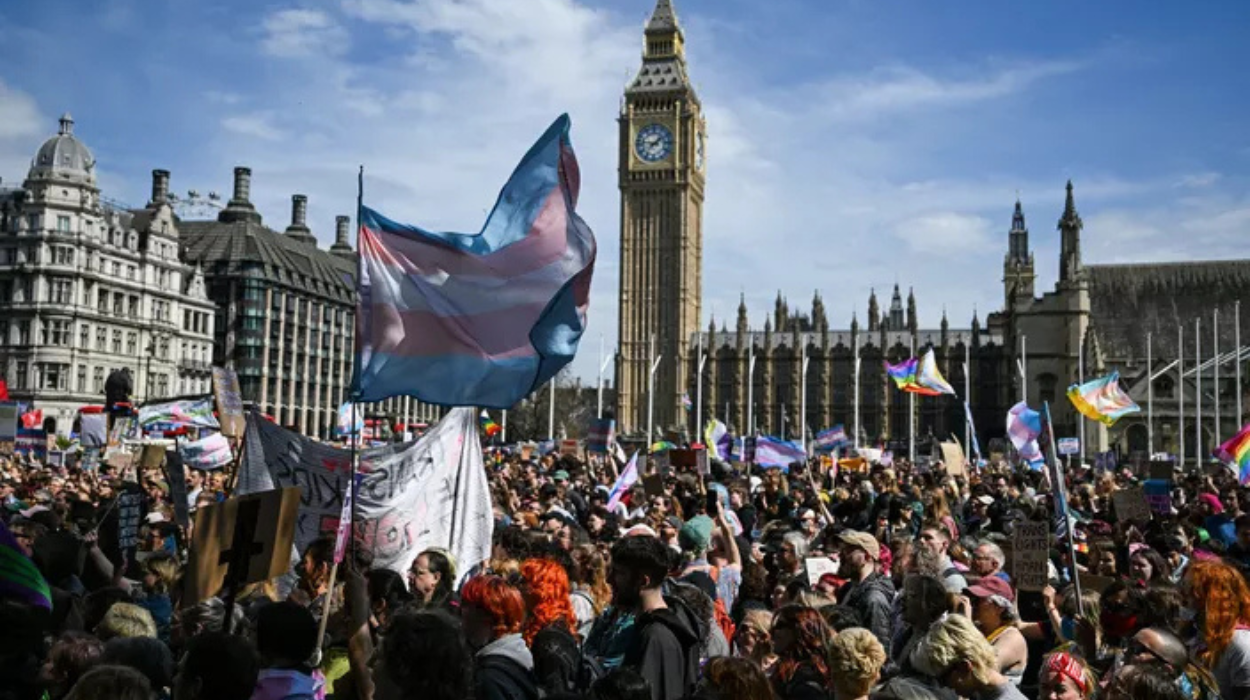
Thousands Protest in London Against UK Supreme Court’s Legal Definition of ‘Woman’
Thousands of demonstrators gathered in London on Saturday in support of transgender rights, just three days after the UK Supreme Court ruled that the legal definition of a woman should be based on biological sex. The decision marked the end of a seven-year legal battle between the Scottish Government and the advocacy group For Women Scotland.
At the heart of the case was a clash of interpretations: the Scottish Government argued that transgender women, whether or not they held a Gender Recognition Certificate (GRC)—a document that legally affirms gender change—should be entitled to the same protections as all women under the Equality Act. For Women Scotland, however, insisted that these legal protections should apply only to those born female.
Read Also: London Crowned Best City in the UK for Sports Enthusiasts
The judges were tasked with determining what “sex” means under UK equality law: biological sex or legal gender? The court ultimately sided with the biological definition.
Court’s Statement and Public Reaction
“The unanimous decision of this court is that the terms ‘woman’ and ‘sex’ in the Equality Act 2010 refer to biological sex,” stated Lord Patrick Hodge, the court’s vice-president, while delivering the verdict.
He also added a note of caution:
“We discourage reading this ruling as a victory for one group in society over another.”
However, many demonstrators in Parliament Square saw it precisely as a loss for the transgender community.
Despite the Court’s insistence that the judgment does not diminish the rights of transgender people regarding discrimination or harassment, protestors viewed the ruling as a rollback of trans rights in the UK.
Protest Signs and Personal Stories
The protest was characterized by signs reading:
- “Trans women are women”
- “Trans people are not the enemy”
- “Me? A man? Shut up!”
Many demonstrators, mostly in their twenties and thirties, voiced fears about the future of transgender rights in the UK.
“Everything about my transition is going to be more complicated now,” said Joe Brown, a 29-year-old trans woman currently undergoing gender transition.
“Because of this ruling, I think trans kids will be more afraid to come out. And I worry we might lose access to healthcare.”
Political and Social Reactions
The protest was organized by several LGBTQ+ rights groups, including Pride in Labour. Its co-chair, Avery Greatorex, emphasized the need for continued political pressure:
“We’re here to push the government and the public to act—to protect the rights of transgender people.”
The UK’s centre-left government, led by Prime Minister Keir Starmer, responded to the Supreme Court ruling by saying it brings clarity for women and for service providers such as hospitals, shelters, and sports clubs.
An Ongoing Debate
While the government views the ruling as a way to provide certainty in applying the Equality Act, activists see it as a troubling step backward. The protest in London highlights the growing divide between legal interpretations of gender and the lived experiences of trans individuals.
As the debate continues, many in the UK are asking whether the law should evolve to better reflect the complexities of gender identity in the 21st century.





